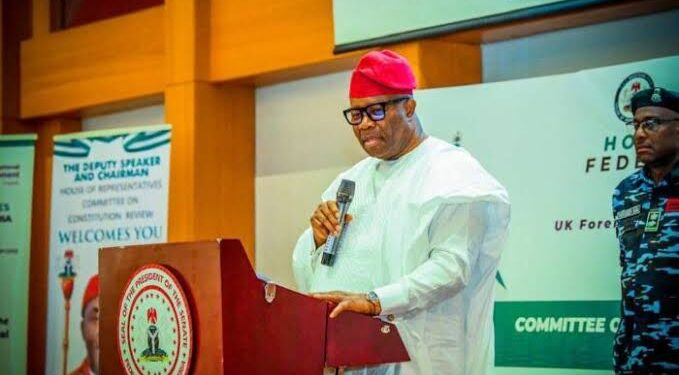The Senate Ad Hoc Committee on Constitution Review commenced a two-day retreat in Kano yesterday, with State Police, Women Rights and Local Government Autonomy topping discussions.
The lawmakers said that the National Assembly plans to present a draft bill by December 2025.
During the event, organized in collaboration with the Policy and Legal Advocacy Centre (PLAC), participants underscored the importance of focusing proposed amendments on Local Government Autonomy, State Police, and the specific roles of traditional rulers to address security challenges.
The forum reached a consensus that National Assembly committees from both chambers should engage with state governors, state assemblies, the judiciary, civil society organizations, and other key stakeholders to prevent potential rejections of bills at the state level.
In his opening remarks, Senator Jibrin Barau, Deputy President of the Senate and Chairman of the Senate Committee on Constitution Review, assured attendees that the ongoing constitutional review would reflect the desires and aspirations of the Nigerian populace.
He stated, “It is our duty to collaborate with our colleagues and stakeholders to produce a comprehensive report and recommendations for the Senate of the Federal Republic of Nigeria to deliberate and approve. As we embark on this vital journey, let us hold onto the core values that elevate nations: freedom, equality, and justice. These ideals should guide our efforts as we contemplate amendments to our Constitution with care and thoughtfulness.
Our decisions today will impact future generations, and we must ensure they serve the best interests of all Nigerians. To achieve meaningful reform, we must collaborate with our counterparts in the House of Representatives and engage with critical stakeholders, including the executive branch, state governors, state assemblies, the judiciary, and civil society organizations, to reach a consensus on contentious issues. Our success relies on our ability to work together, sharing insights and expertise to create a report for the Senate’s legislative actions. This retreat offers a unique opportunity for constructive dialogue and collective problem-solving,” Barau emphasized.
Rt. Hon. Benjamin Kalu, Deputy Speaker of the House of Representatives and chair of the House’s constitution review panel, noted that the retreat allowed the Senate to reflect on the process and challenges of constitutional amendments. He mentioned that other stakeholders would have the chance to provide input to guide the committee in shaping its direction and approach.
Represented by House Leader Julius Ihonvbere, Kalu highlighted that the collaboration between both chambers would enable the federal parliament to complete the constitutional amendment process by the proposed December 2025 deadline, avoiding interruptions from political campaigns leading up to the 2027 elections.
He proposed that both chambers engage with political leaders, traditional rulers, and faith-based organizations, and conduct joint meetings with state governors and panel consultants to harmonize documentation. Kalu further suggested that the Senate and House panels hold joint zonal public hearings to expedite the review process.
Adebo Edward Ogundoyin, Chairman of the Conference of State Houses of Assembly Speakers, expressed satisfaction that the review process began earlier than in previous assemblies. He noted that the last assembly’s late start affected the timely transmission of views to state assemblies.
Ogundoyin, also the Speaker of the Oyo State House of Assembly, said, “This early start will allow us ample time to review the transmitted views before they reach the state assemblies for approval. We reiterate our call for the prompt transmission of National Assembly resolutions on proposed amendments for effective implementation at the sub-national level. The challenges posed by the electoral activities during the 2023 general elections nearly hindered the last constitutional alteration. We are determined to avoid such issues, and an early start is essential for a smooth process.”
Ahmad Lawan, President of the 9th Senate, expressed hope that the 10th National Assembly would set realistic constitutional review targets that align with the demands of Nigerians. He recalled that the last assembly passed 62 issues, with 44 harmonized versions sent to the states, of which 35 were approved by the then-President.
Lawan urged his colleagues to focus on issues concerning women and the constitutional roles of traditional rulers, noting that several women-related bills failed to pass. He remarked, “The time is right for women’s forums to be given opportunities to contribute effectively. Our traditional leaders also have vital roles, and we should consider granting them formal roles to enhance their contributions.”
He also advocated for the National Assembly to legitimize the Supreme Court’s judgment on local government autonomy, emphasizing that states should manage their resources independently and that local governments need revitalization, as many currently operate ineffectively or not at all.











